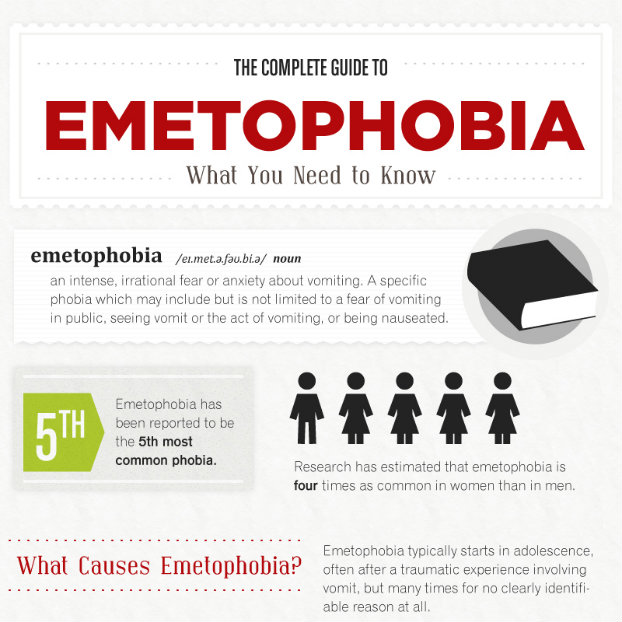 Emetophobia is an extremely strong fear of vomiting. For most, it begins in childhood or adolescence and continues long into adulthood.
Emetophobia is an extremely strong fear of vomiting. For most, it begins in childhood or adolescence and continues long into adulthood.
Specialists disagree about whether emetophobia is a very common fear or an exceptionally rare one. This is because it’s natural for humans to feel disgusted and repulsed by illness. Biologically, it benefits us to steer clear of anything that can cause us harm; it’s just basic survival.
Because the human response to illness is so negative, most people don’t think of emetophobia as a serious, life-altering condition. This may be why emetophobia is so little studied.
People who have emetophobia understand the complexity and all-consuming nature of the disorder. Unfortunately, it can also lead to other conditions. Some phobias that often accompany emetophobia are:
-a fear or avoidance of certain foods
-a fear of flying
-a fear of traveling long distances
-a fear of being around children or babies
Untreated emetophobia can also lead to eating disorders (e.g., anorexia) or Obsessive-Compulsive Disorder (OCD). People who have emetophobia and an eating disorder will usually limit what they eat to avoid vomiting. In extreme cases, these individuals will stop eating and even drinking entirely. Emetophobia which is that severe must be treated immediately.
For a person who has emetophobia and Obsessive-Compulsive Disorder, ritual behaviors become a major issue. An example of a ritualistic action is constant checking and re-checking of food for freshness. The compulsive behavior can also manifest itself as repeated washing of food.
The best way to avoid developing a secondary phobia or disorder is to learn ways to deal with your emetophobia as soon as you realize you have a problem. You can talk to a doctor, a therapist, or any other licensed health professional. If you find that the person from whom you’re seeking help is unsympathetic, skeptical, or generally negative, try going to see someone else who can recognize the seriousness of having emetophobia.
If you’re not ready to see a professional, there are other options you can explore. Search the Internet for articles and fact sheets about emetophobia. Learn as much as you can about the condition so you can gain a better understanding of it. You can also use your knowledge to educate others and spread awareness of the phobia.
There are also forums and online communities you can join. Engaging in discussion with other people who have emetophobia will allow you to form a network of support and get advice on how to cope with the disorder in a healthy way.





